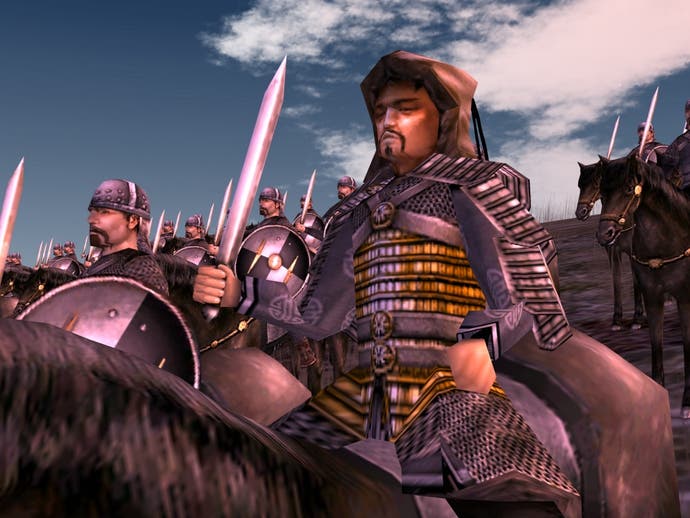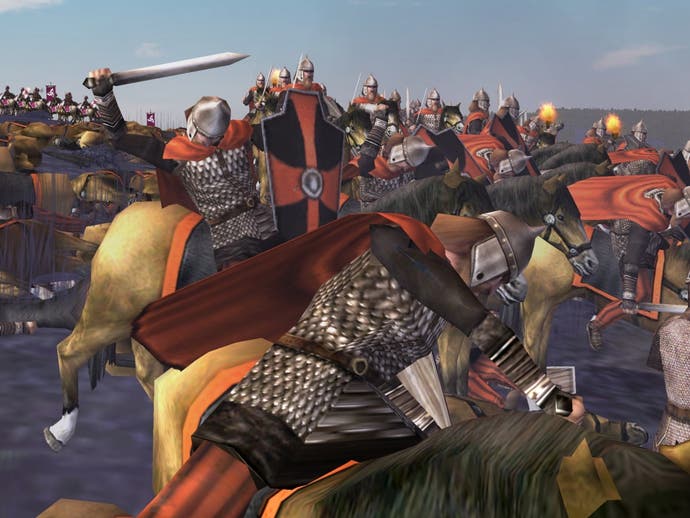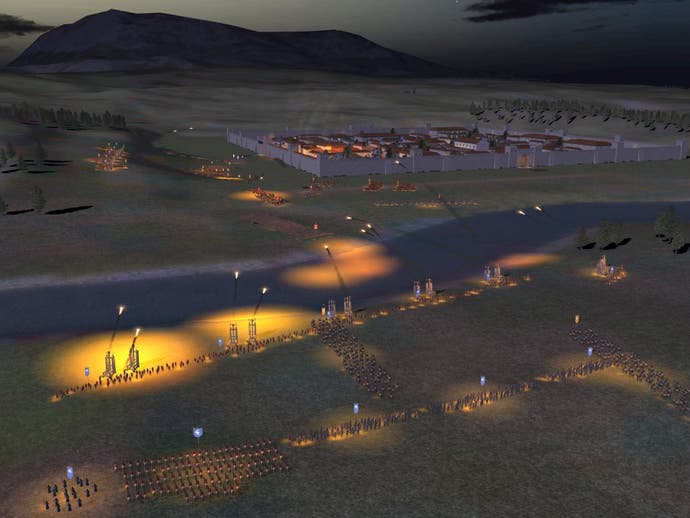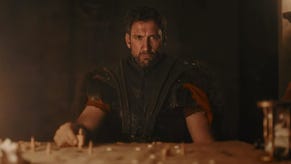Rome: Total War - Barbarian Invasion
Less fashionable than Rome: Total War Barbie Invasion.
Total War's been reigning champion of the strategy game for the last five years. And, yes, it's been deposed twice, but only by its sequel. It does something that nothing else does even half as well, and at times seems to be the keeper of the progressive spirit for the whole damn genre. All true. But there's a question that nags me as I start to play this latest add-on.
Am I getting bored of it?
As I settled into the saddle of the horse I was born in, and consider the new options there's a half hour or so where there's a genuine sliver of worry. Sure, the game's as solid as ever – I wouldn't be able to slag it because I'd seen its tricks before in a review. In games, for me, love doesn't fade into loathing but respect. But it's still not love...
And then the Huns sweep into Constantinople, I find myself grinning like a steppes-riding maniac and the magic consumes me.
In some ways, it's interesting to see just how Creative Assembly approach the mission packs. Not in a case of wondering what they're actually going to do, because its always the same thing (Barbarians Invade the civilisation that was built in the main game – Mongols into Japan for Shogun, Vikings into England for Medieval) but rather wondering what bits of design they're going to use to illustrate it. It's a familiar tune but the improvisations make it feel like game-jazz.
(And, yeah, I'm getting purple. But this is Total War. If I'm not allowed to reach for the jar of special words for this, what am I allowed them for?)

The biggest change, in terms of how it alters how the game plays, is that the more barbarous races are able to form hordes. This is to simulate exactly how mobile the tribes-people were in this era, knocking over each other like a row of dominos, with progressive waves of tribes pushing everyone westward. The Vandals, starting in Europe, ended up in North Africa. In game terms, this means when the final settlement of your empire falls, as long as you're a tribes-type, you're not knocked out, but rather your entire population become mobile armies which don't require financial upkeep. As well as whatever troops you've managed to amass, you get a whole selection of new armies to march off and find a new homeland. That is, find a new homeland and kick out its current tenants.
Several of the races – such as the Huns I've become terribly enamoured with – actually start in the horde formation, and are the catalyst to the general destruction of the world. They've got the initial tactical question – do you settle early, and so transfer as much of their roving armies into useful population, or do you push on as far into the rich Mediterranean lands as you can, and risk depleting their troops? Or do you employ a scorched earth policy, attacking people on the way, sacking (which is a more extreme version than the previous settlement-destruction options) all the passing settlements, so gaining masses of cash, at the cost of a quicker depletion of troops? Either way, the fall out is going to chase you. My annihilation of a couple of tribes lead to all them becoming mobile, and heading off. By the time I'd settled in Constantinople, one of the hordes I'd created wandered into my territory – and with my armies now citizens, I didn't have anywhere near enough force to stop them taking a city away from me. Damn. That they headed off in westward, along with the hordes which they had created... well, I had to question my actions. And admire them. The world's burning! Awesome!

More than any of the other expansion packs, there's an apocalyptic feel to Barbarian Invasion. Nation after nation becomes tribal, heading out to find new homes, burning places to the ground en route and the Roman Empire visibly falters. Even early in one of my games, I saw that huge numbers of provinces were in the hand of independent rebels – which in Barbarian Invasion is a sign that someone has sacked the settlement then moved on – and the Eastern Roman Empire had divided into three warring factions.
It's the end of the world as they know it. You, with the gift of 1500 years of separation, feel fine.
That's the basics of what Barbarian Invasion offers – a more driven campaign than the traditional one, which inverses the difficulties. Previously, the rough lads had a hard time of it when the Romans were generally triumphant. Here, it'll be a serious pilum-bearer who'll be up to the task of preserving (or even reuniting, since its split into the East and West empires) the Roman Empire. There is, of course, more. The map's been reworked into new, period-proper provinces. Religion's importance has been increased, with Christianity, Paganism and the middle-eastern Zoroastrianism beliefs all influencing the population, with religious differences causing civil strife.

On a basic “new unit” level, the vast majority are appropriate and unique for the period. There's even some new special moves, with shield walls and a anti-cavalry circular-spear-pointing hedgehog available. Also, for those who want to get their swimming certificate half way through a campaign, there's the ability for certain unit types to swim, which is handy to try and avoid the killing grounds of bridge-crossing. While it has important tactical uses for those who'd wish to try it, the new night fighting option for experienced generals offers striking visual set-pieces that provide equally striking reasons to consider it. A sea of torches marching towards a high wall and a wave of flaming arrows streaking through the night...
Why not a nine? As magnificent an example of the add-on pack as Rome is, it doesn't redefine the game completely in order to make it an absolute essential buy for anyone who was interested in the mother-game. It's an imaginative more-of-the-same, but still – at its core – a more of the same. The mark's a buying guide, so an eight.
But that's only a mark. With Barbarian Invasion, the only mark that really matters is the mark you make on the world. That's what it gives you: Here's a world. Try to crush it or try to save it. It's your call.
And it's beautiful, like micromanaging while Rome burns.



